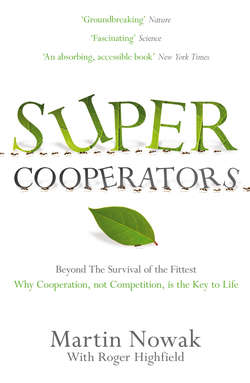Читать книгу SuperCooperators - Roger Highfield - Страница 20
На сайте Литреса книга снята с продажи.
NOISE
ОглавлениеSo far, so satisfyingly straightforward. But there is a problem with Tit for Tat, one that is not immediately obvious when using computer programs that interact flawlessly. Humans and other animals make mistakes. Sometimes their wires get crossed. Sometimes the players become distracted. They suffer mood swings. Or they simply have a bad day. Nobody’s perfect, after all. One type of mistake is due to a “trembling hand”: I would like to cooperate but I slip up and fail to do so. Another is caused by a “fuzzy mind”: I am convinced that this person was mean to me and defected in the last round, when in fact he did not. Perhaps I was confusing him with someone else. Trembling hands and fuzzy minds lead to what I call “noisy” interactions.
The significant role of noise for the evolution of cooperation was first pointed out in a paper in the journal Nature by Robert May of Oxford University, a brilliant former physicist who would come to exert a profound influence on theoretical biology. Bob (being Australian, he prefers “Bob”) is best known for the great strides he made in putting ecology on a mathematical basis. In his short essay he argued that evolutionary biologists should study the influence of mistakes on the repeated Prisoner’s Dilemma. He realized that the conclusions from a game that is perfectly played, as was the case in Axelrod’s tournaments, are not necessarily robust or realistic.
This is an important point. Even infrequent mistakes can have devastating consequences. When pitched against another player adopting the same approach, the Tit-for-Tat strategy can trigger endless cycles of retaliation. Since all it knows how to do is strike back at defectors, one scrambled signal or slipup can send Tit for Tat spiraling ever downward into vendettas that overshadow those seen in Romeo and Juliet, between the Hatfields and McCoys, or anything witnessed in Corsica, for that matter. The obvious way to end this bloody spiral of retaliation is to let bygones be bygones: for example, only to demand revenge now and again, or to decide it by the throw of a die. Inspired by this important insight, I would extend Axelrod’s pioneering work and incorporate the effects of noise to make it more true to life.
